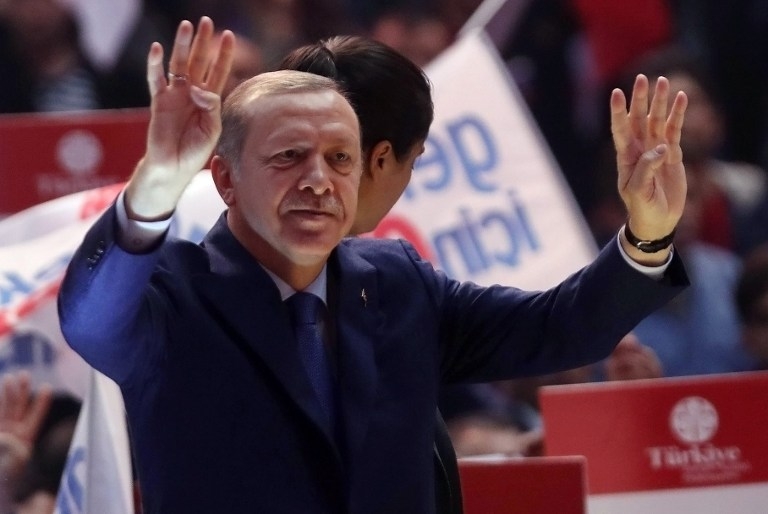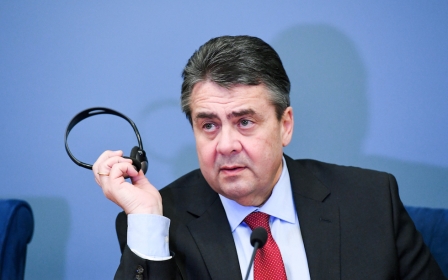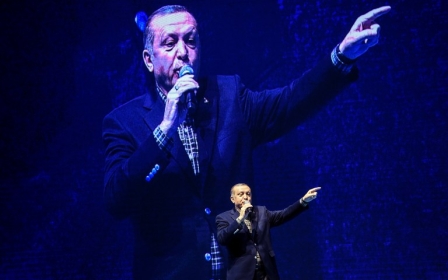President Erdogan brands Dutch 'Nazi remnants' in rally dispute

Turkish President Recep Tayyip Erdogan branded the Netherlands "Nazi remnants, fascists" on Saturday after the Dutch government withdrew permission for his foreign minister to land there.
Dutch Prime Minister Mark Rutte refused permission for Turkish Foreign Minister Mevlut Cavusoglu's plane to land in the Netherlands on Saturday morning, as a row over a cancelled Rotterdam rally intensified.
Cavusoglu planned to attend the rally in support of a "yes" vote in a referendum next month that would give Erdogan increased powers and allow him to remain in the post until 2029. The rally was banned for security reasons, Rotterdam's mayor said.
The Turkish leader has responded to Dutch action with threats of retaliation.
"Listen Netherlands, you'll jump once, you'll jump twice, but my people will thwart your game," Erdogan said at a rally in Istanbul. "You can cancel our foreign minister's flight as much as you want, but let's see how your flights come to Turkey now.
"They don't know diplomacy or politics. They are Nazi remnants. They are fascists."
Turkey also summoned the Dutch charge d'affaires to the foreign ministry in Ankara in protest, AFP reported.
Responding to the Turkish leader's comments, Rutte said on Saturday that he understood Turkish anger but that comparing the Dutch to the Nazis was "way out of line".
"It's a crazy remark of course," Rutte told journalists during campaigning for the Netherlands' general election, to be held 15 March. "I understand they're angry, but this of course was way out of line."
Rotterdam city authorities had earlier banned Cavusoglu from addressing the rally, but he had said he would fly to the city anyway and accused the Hague of treating Turkish citizens in the country like "hostages".
"I sent them so they could contribute to your economy ... They're not your captives," he told CNN Turk television.
"If my going will increase tensions, let it be. What damage will my going have on them? I am a foreign minister, and I can go wherever I want," he said before the Dutch barred his flight.
Rutte said in a statement published on his official Facebook page on Saturday morning, before Erdogan's Nazi comments, that Turkey, by calling for a massive public rally, had upset discussions under which Cavusoglu would have been allowed to enter the country.
Rutte said that while the Netherlands and Turkey could search for "an acceptable solution," Turkey was not respecting the rules relating to public gatherings.
"Many Dutch people with a Turkish background are authorized to vote in the referendum over the Turkish constitution. The Dutch government does not have any protest against gatherings in our country to inform them about it," he said on Facebook.
The Dutch government added in a statement: "The Turkish authorities have publicly threatened sanctions.
"For that reason the Netherlands has let it be known it will withdraw permission to land" the minister's plane.
The row has is likely to cause politics problems in Brussels as Turkey is a partner in an EU deal to limit the movement of migrants and refugees to Europe. In the past, Turkey has threatened to "open the gates" if the EU goes back on promises to provide aid as well as visa-free travel for its citizens.
Other European countries, including Austria, Germany and Switzerland, have banned similar gatherings where Turkish officials were due to speak in favour of a "yes" vote in the referendum.
Earlier this week, cancellations of events in Germany led Erdogan to accuse Berlin of "Nazi practises," in comments that drew a strong reply from German leaders, with Chancellor Angela Merkel describing the comparison as "unacceptable".
As Erdogan seeks to extend his powers in the 16 April referendum vote, he is targeting millions of expatriate voters eligible to cast a ballot, including 1.4 million in Germany.
Erdogan is looking to the large number of emigre Turks living in Europe, especially Germany and the Netherlands, to help clinch victory in the referendum, which will shape the future of a country whose position on the edge of the Middle East makes it of crucial strategic importance to NATO.
He has cited domestic threats from Kurdish and Islamist militants and a coup attempt last July as cause to vote "yes" to his new powers. But he has also drawn on the emotionally charged row with Europe to portray Turkey as betrayed by allies, facing wars on its southern borders and in need of strong leadership.
Relations between Turkey, a key NATO ally, and some European countries have soured since last year's attempted coup.
Political leaders in Germany has been critical of the mass arrests and human rights crackdown that followed it, while others have expressed concern that Turkey is sliding toward authoritarian rule under Erdogan.
The Dutch are due to vote in a national election on Wednesday, in which anti-immigration sentiment has played a prominent role.
Dutch far-right anti-Islam MP Geert Wilders, who hopes to triumph in the election, celebrated the government's ban, attributing it to "heavy PVV pressure," in a reference to his party.
"I call on Prime Minister Rutte, in the name of millions of Dutch people, to refuse the Turkish minister to the Netherlands!" He tweeted earlier Saturday.
"Do not let him land here!" wrote Wilders.
Middle East Eye propose une couverture et une analyse indépendantes et incomparables du Moyen-Orient, de l’Afrique du Nord et d’autres régions du monde. Pour en savoir plus sur la reprise de ce contenu et les frais qui s’appliquent, veuillez remplir ce formulaire [en anglais]. Pour en savoir plus sur MEE, cliquez ici [en anglais].




